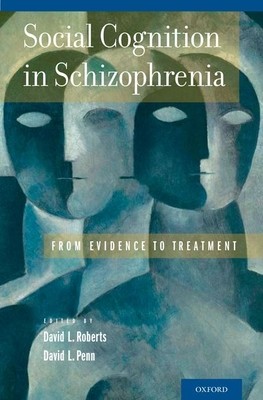
- We will send in 10–14 business days.
- Publisher: Oxford University Press, USA
- ISBN-10: 0199777586
- ISBN-13: 9780199777587
- Format: 15.5 x 23.6 x 2.8 cm, hardcover
- Language: English
- SAVE -10% with code: EXTRA
Social Cognition in Schizophrenia (e-book) (used book) | bookbook.eu
Reviews
Description
Individuals with schizophrenia and related disorders experience significant functioning deficits in the community. The study of social cognition in schizophrenia has grown rapidly over the past decade, and a consensus has developed among researchers that dysfunction in social cognition may contribute to the severe interpersonal problems that are a hallmark of schizophrenia. This has generated hope that treatments which improve social cognition in this illness may enhance an individual's ability to live a socially engaged and rewarding life.
Social Cognition in Schizophrenia: From Evidence to Treatment provides a firm grounding in the theory and research of normal social cognition, builds on this base to describe how social cognition appears to be dysfunctional in schizophrenia, and explains how this dysfunction might be ameliorated. Composed of contributed chapters written by the top experts in the field, the volume is divided into three parts to address each of these areas. Part I, Foundations of Human Social Cognition, explores normal social cognition in childhood development, adulthood, and across cultures, as well the brain-bases of social cognition and clinical social cognition research. Part II, Social Cognition in Schizophrenia: Descriptive and Experimental Research, discusses social cognition and functional outcome, emotion processing, Theory of Mind, paranoid ideation, social cognition in early psychosis, and the social cognitive neuroscience of schizophrenia. Part III, Social Cognition in Schizophrenia:Treatment Approaches, focuses on findings from current treatment outcome research as well as several leading social cognitive intervention approaches-Integrated Neurocognitive Therapy (INT), Cognitive Enhancement Therapy (CET), Metacognitive Training (MCT), and Social Cognition and Interaction Training (SCIT). This comprehensive, accessible volume will be invaluable to researchers studying social cognition and psychosocial treatment development in schizophrenia, clinicians working with this patient population, students in social and clinical psychology, nursing, social work and occupational therapy, and medical students.
EXTRA 10 % discount with code: EXTRA
The promotion ends in 17d.19:28:55
The discount code is valid when purchasing from 10 €. Discounts do not stack.
- Publisher: Oxford University Press, USA
- ISBN-10: 0199777586
- ISBN-13: 9780199777587
- Format: 15.5 x 23.6 x 2.8 cm, hardcover
- Language: English English
Individuals with schizophrenia and related disorders experience significant functioning deficits in the community. The study of social cognition in schizophrenia has grown rapidly over the past decade, and a consensus has developed among researchers that dysfunction in social cognition may contribute to the severe interpersonal problems that are a hallmark of schizophrenia. This has generated hope that treatments which improve social cognition in this illness may enhance an individual's ability to live a socially engaged and rewarding life.
Social Cognition in Schizophrenia: From Evidence to Treatment provides a firm grounding in the theory and research of normal social cognition, builds on this base to describe how social cognition appears to be dysfunctional in schizophrenia, and explains how this dysfunction might be ameliorated. Composed of contributed chapters written by the top experts in the field, the volume is divided into three parts to address each of these areas. Part I, Foundations of Human Social Cognition, explores normal social cognition in childhood development, adulthood, and across cultures, as well the brain-bases of social cognition and clinical social cognition research. Part II, Social Cognition in Schizophrenia: Descriptive and Experimental Research, discusses social cognition and functional outcome, emotion processing, Theory of Mind, paranoid ideation, social cognition in early psychosis, and the social cognitive neuroscience of schizophrenia. Part III, Social Cognition in Schizophrenia:Treatment Approaches, focuses on findings from current treatment outcome research as well as several leading social cognitive intervention approaches-Integrated Neurocognitive Therapy (INT), Cognitive Enhancement Therapy (CET), Metacognitive Training (MCT), and Social Cognition and Interaction Training (SCIT). This comprehensive, accessible volume will be invaluable to researchers studying social cognition and psychosocial treatment development in schizophrenia, clinicians working with this patient population, students in social and clinical psychology, nursing, social work and occupational therapy, and medical students.


Reviews